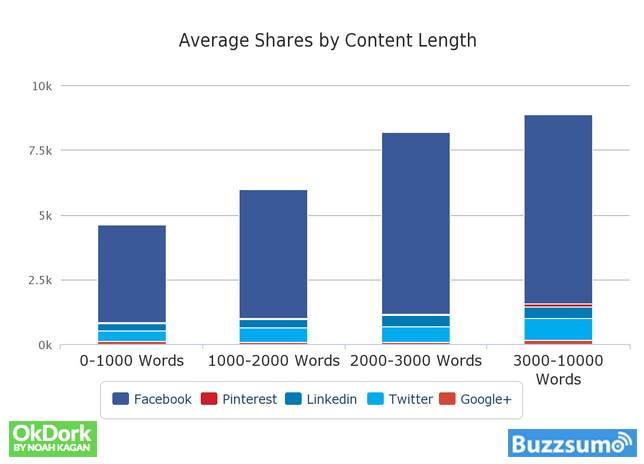If you do a little research on search engine optimization (SEO), one thing becomes clear — long-form content is important for SEO. Creating detailed, in-depth articles provides significant value to readers and often leads to better search engine rankings.
Long-form content isn’t just about writing more words. It’s about exploring topics deeply and providing valuable insights. This thorough approach helps both readers and search engines, showing that your content is high-quality and relevant.
This post will explore how long-form content affects SEO. We’ll discuss its SEO benefits, share relevant statistics from real-life examples, and provide tips for creating effective long-form content and optimizing it for SEO.
The Relevance and Impact of Long-Form Content in SEO
Understanding what users are looking for is key in SEO. When users search for information, they want comprehensive and detailed answers. Long-form content addresses this need by providing in-depth coverage of complex topics.
Keeping this idea in mind when designing your content strategy helps in creating content that really meets the needs of people searching online and can contribute significantly to your SEO success.
To better understand the impact of long-form blog posts, here are some clear benefits:
- Builds topical authority: Utilize long-form content to show your expertise and authority. This helps search engines see your site as a reliable source of information. According to a marketing study by Backlinko, the average length of a top-ranking Google article is 1,447 words. When you create long-form content, you’re more likely to rank higher on search engine results pages:

-
Improves user engagement metrics: Longer content keeps readers on your page longer when compared to short-form content, which can lower bounce rates and increase the average time spent on your site. In-depth articles also tend to get more shares on social media platforms. An analysis by BuzzSumo of 100 million articles found that long-form content with a word count of 3,000-10,000 words averaged the most shares on social media channels:

- Attracts more backlinks: Quality long-form content often gets more backlinks, which are vital for SEO success and better search rankings. One analysis found that long-form content generates 77.2% more backlinks than short articles.
Key Takeaway: Unlike short-form content, long-form content not only answers detailed user questions but also greatly enhances SEO by improving engagement and authority.
Best Practices for Long-Form Content
Creating long-form content for SEO requires more than just writing long articles. It’s essential to keep your long-form content fresh and updated. Consider Wikipedia — its frequent updates keep it as a top resource online.
While focusing on length might be tempting, the real value is in the quality of the content. High-quality content captures readers’ interest and motivates them to share it.
To improve your long-form content, try these actionable tips:
- Regular updates: Search results favor content that remains current and relevant, so keeping your content fresh and updated is crucial. Regular updates also ensure that your content stays accurate and continues to meet the needs of your audience.
- Focus on quality: While it might be tempting to focus on length, the true value lies in the quality of your content, even for short blog posts. High-quality content captures readers’ interest and motivates your target audience to share it. Try to include infographics if possible, as research by industry publications has shown that type of visual content is 3x more likely to get shared on social media than other types of visuals:

- Use multimedia elements: Visual elements like images, infographics, and videos keep readers engaged and make your content more appealing and easier to understand. A study by BuzzSumo found that articles with images every 75–100 words get double the social media shares compared to articles with fewer images. Keep that in mind during the writing process.
- Use clear, informative subheadings: Subheadings help organize your content and make it easier to navigate. They allow readers to quickly find the in-depth information they need, improving the overall user experience. A report from the Content Marketing Institute suggests that well-structured content with clear subheadings can improve readability and retention.
Key Takeaway: Effective long-form pieces aren’t just long; they need to be current, high-quality, and well-organized to capture your audience’s attention and engage readers and search engines.
Optimizing Long-Form Content for SEO Success
If you want to maximize the SEO benefits of long-form content, then you should optimize it effectively. Some tried-and-tested strategies include using keywords strategically, enhancing readability, and ensuring mobile-friendliness.
Let’s go over each one in detail:
- Strategic keyword use: Perform keyword research and try to integrate relevant keywords naturally throughout when you write long-form content. Focus on placing keywords in important areas like the title, headers, and the first 100 words. The presence of target keywords in these positions can significantly improve your search rankings:

-
Enhance readability: When writing long-form content, try to break up your content into short paragraphs and use bullet points where appropriate. This makes your content easier to read and digest. Tools like the Hemingway App can help simplify your test and make it more accessible:

- Ensure mobile-friendliness: Mobile is king. If you want your long-form piece to succeed then make sure that it is mobile-friendly. Use responsive design to ensure your content looks good on all screen sizes. Google’s mobile-first indexing means that the mobile version of your blog post is considered the primary version, so mobile optimization is crucial for SEO success.
Key Takeaway: Optimizing your long-form content for SEO involves strategic keyword use, enhances readability, and mobile-friendliness, which collectively improve search engine rankings and user experience.
Final Word on Long-Form Content SEO
Long-form content is more than just a trend; it’s a strategic approach that boosts SEO performance. It tackles complex user queries and boosts engagement.
By adding high-quality, detailed content to your strategy, you not only enhance your SEO metrics but also position your site as an authority. When you create content, think about how this method can improve your overall digital marketing strategy.
Related Video
If you’re ready to level up your website’s content for SEO success, Single Grain’s SEO experts can help!👇
For more insights and lessons about marketing, check out our Marketing School podcast on YouTube.






